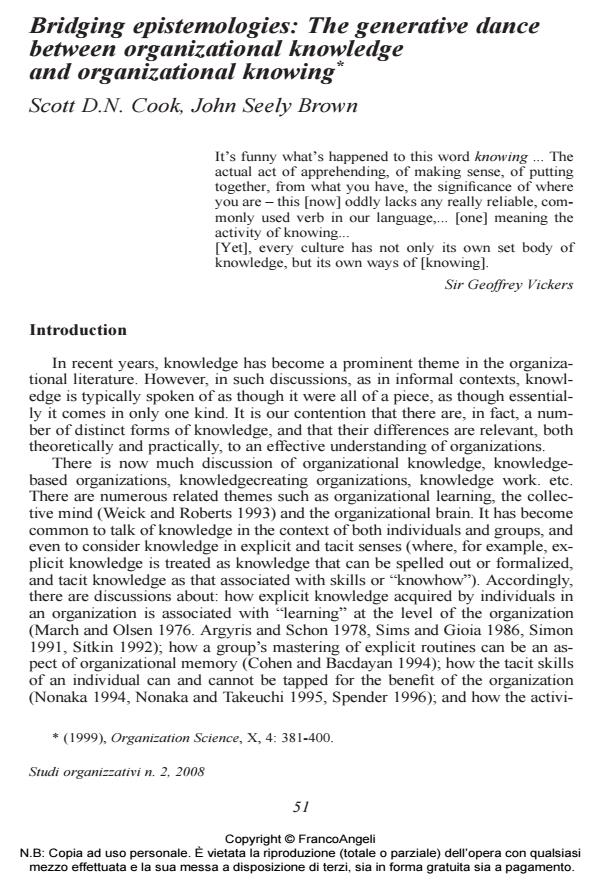Bridging epistemologies: The generative dance between organizational knowledge and organizational knowing
Journal title STUDI ORGANIZZATIVI
Author/s Scott D.N. Cook, John Seely Brown
Publishing Year 2009 Issue 2008/2
Language English Pages 0 P. File size 499 KB
DOI 10.3280/SO2008-002003
DOI is like a bar code for intellectual property: to have more infomation
click here
Below, you can see the article first page
If you want to buy this article in PDF format, you can do it, following the instructions to buy download credits

FrancoAngeli is member of Publishers International Linking Association, Inc (PILA), a not-for-profit association which run the CrossRef service enabling links to and from online scholarly content.
<em>Bridgin Epistemologies: The Generative Dance between Organizational Knowledge and Organizational Knowing</em> - Much current work on organizational knowledge, intellectual capital, knowledge-creating organizations, knowledge work, and the like rests on a single, traditional understanding of the nature of knowledge. We call this understanding the epistemology of possession. since it treats knowledge as something people possess. Yet, this epistemology cannot account for the knowing found in individual and group practice. Knowing as action calls for an epistemology of practice, Moreover, the epistemology of possession tends to privilege explicit over tacit knowledge, and knowledge possessed by individuals over that possessed by groups. Current work on organizations is limited by this privileging and by the scant attention given to knowing in its own right. Organizations are better understood if explicit, tacit, individual and group knowledge are treated as four distinct and coequal forms of knowledge (each doing work the others cannot), and if knowledge and knowing are seen as mutually enabling (not competing). We hold that knowledge Is a tool of knowing, that knowing is an aspect of our interaction with the social and physical world, and that the interplay of knowledge and knowing can generate new knowledge and new ways of knowing. We believe this generative dance between knowledge and knowing is a powerful source of organizational innovation. Harnessing this innovation calls for organizational and technological infrastructures that support the interplay of knowledge and knowing. Ultimately, these concepts make possible a more robust framing of such epistemologically-centered concerns as core competencies, the management of intellectual capital, etc. We explore these views through three brief case studies drawn from recent research.
- Langue, économie et entreprise : le travail des mots Jean-Yves Barbier, pp.201 (ISBN:9782878543834)
- Mathematics teacher educators’ navigational expertise when designing multimodal representations of practice: a semiotic analysis Gil Schwarts, Patricio Herbst, Daniel Chazan, Orly Buchbinder, Lawrence M. Clark, Rob Wieman, William Zahner, in Journal of Mathematics Teacher Education /2025 pp.341
DOI: 10.1007/s10857-024-09658-y
Scott D.N. Cook, John Seely Brown, Bridging epistemologies: The generative dance between organizational knowledge and organizational knowing in "STUDI ORGANIZZATIVI " 2/2008, pp , DOI: 10.3280/SO2008-002003